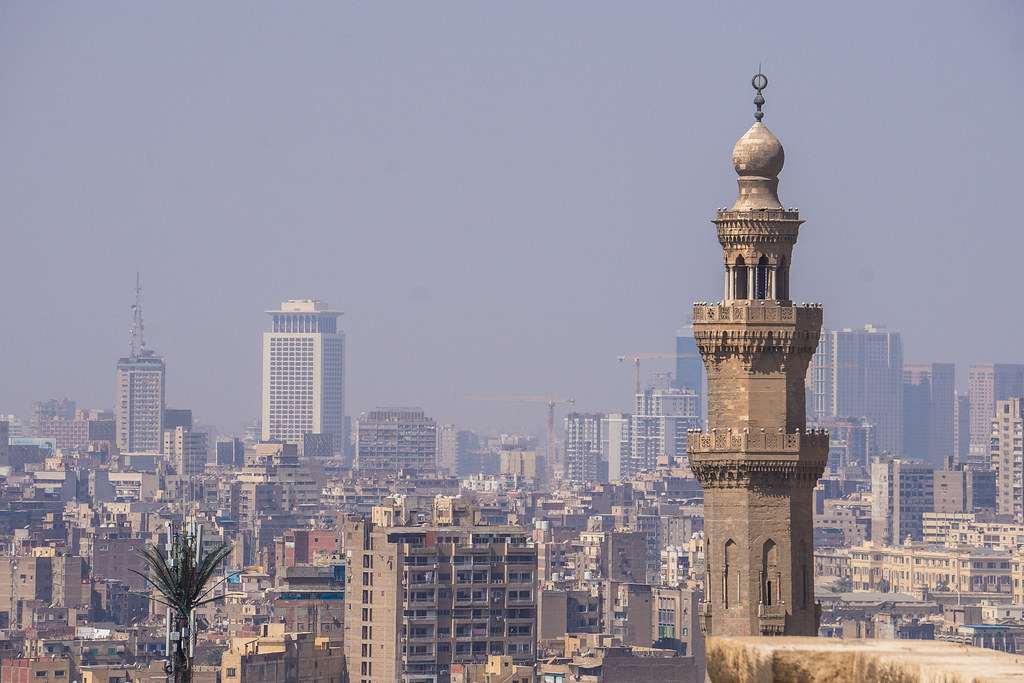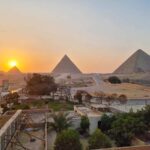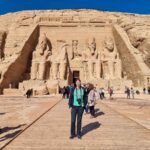Most of the people who visit Egypt, and are interested in a historical tour rather than a beach vacation, will land in Cairo, the capital. Cairo is a massive city, extremely busy, and it can be very overwhelming for first time visitors.
In this two days in Cairo itinerary I will show you how to visit as many places as possible in the city without spending too much time stuck in traffic, based on my own experience. The traffic in Cairo can be daunting, especially during the rush hour, when nothing seems to move.
I feel that two days is enough to explore the major sites in Cairo, at a good pace, without feeling rushed. I had some extra time which I spent walking along the Nile, just before sunset. In this two days in Cairo itinerary I also included some evening activities, which you may want to consider if you want to delve more into the local culture.
Where to Stay in Cairo

There are two main areas I recommend you to choose when booking your hotel when you visit Cairo: Giza, Downtown Cairo, or Zamalek. I spent three nights in Cairo, one at the beginning of my trip to Egypt and two at the end. I chose to remain at the same hotel in Giza, but after loosing so much time in traffic, I wished I had booked a hotel in Downtown Cairo for my last two nights. Pick your hotel after you have decided what you want to see in Cairo, based on where most of the touristic attracts on your itinerary are.
Staying in Giza, at a hotel with a Pyramids view is a one-of-a-kind experience, but think if it’s worth it, if most of the things you want to see are in the old part of Cairo.
The Pyramids
Budget: Pyramids View Inn

I booked the Pyramids View Inn because of its view. This modest B&B is located just across the street from the Sphynx entrance to the Pyramids and had the most amazing front line view over the Giza plateau. I don’t think you can do any better. I paid £45 a night for a room with a balcony and a view of the Pyramids. I could literally see the Khufu Pyramid from my bed. Breakfast was included as well, and I could watch the lights and sound show for free from the rooftop terrace.
You can read more reviews of the Pyramids View Inn on Tripadvisor by clicking here, or click here to see the latest rates on Booking.com
High-End: Mena House
Even if you haven’t visited Cairo, you have probably heard about Mena House, a high-end hotel overlooking the Pyramids. Most of the influencers choose to stay at Mena House so they can take photos in their garden, with the unspoiled background of the Pyramids.
As Mena House is a five star hotel, part of the Marriott group, staying here however will cost at least £150/night. Still, if you want to treat yourself for a night, go for it!
You can read more reviews of the Mena House on Tripadvisor by clicking here, or click here to see the latest rates on Booking.com
Downtown Cairo
Budget: Tahrir Plaza Suites
If you choose to stay in Downtown Cairo, check out the modest but elegant and clean hotel close to the Egyptian Museum. The rooms are decorated in a modern manner, and the staff are extremely welcoming. A room here starts at £30 a night.
You can read more reviews about the Tahrir Plaza Suites on Tripadvisor by clicking here, or click here to see the latest rates on Booking.com
High-End: Sofitel Nile El Gezirah
The Sofitel Nile El Gezirah is located in Zamalek and features a pool with gorgeous views over River Nile. The rooms are spacious and have great views over the river and the city. The superior rooms have access to the lounge and come with a butler service. The hotel also has a spa centre, six restaurants and four bars. A room here starts at £110 a night.
You can read more reviews of the Sofitel Nile El Gezirah Hotel on Tripadvisor by clicking here, or click here to see the latest rates on Booking.com
How to Move Around Cairo
In my opinion, the only way to travel around Cairo is by using Uber or the metro system. I don’t recommend using the local taxis as they don’t have meters and it’s hard to negotiate the right fare. With Uber, you know exactly how much you will pay for the ride, as well as an approximate arrival time to your destination.
Uber in Cairo is very affordable, with prices between 70 – 105 Egyptian Pounds (£3-£5) for a one-hour ride between Downtown Cairo and Giza.
Is Cairo Safe for a Solo Female Traveller?

I didn’t feel unsafe at all exploring Cairo on my own. I did use guides to see the Pyramids and the Mosques, but otherwise I went around on my own. I found that most people I interacted with in Cairo were very friendly and happy to chat with me, especially the Uber drivers I regularly got stuck in traffic with.
The only place where I felt a bit uncomfortable was at the train station, but not because I feared for my safety. The area around the train station is extremely busy and noisy. As well many people moving around at a fast pace, there are street vendors and a lot of cars, so waiting for an Uber there can be quite stressful. After two years of pandemic and mostly silence, I didn’t feel comfortable being surrounded by so much noise.
Day 1:
The Pyramids

Start your two days in Cairo itinerary with a visit to the last remaining Ancient Wonder of the World: The Pyramids of Giza. I highly recommend you arrive as soon as the site opens, in order to experience it without too many other people around. Most of the tours will go to Memphis and Saqqara before the Pyramids. Just after 11, the site starts to become busy, with tourist buses arriving one after the other.
If you base yourself in Giza, you can be at the gates at 8-8:30, as soon as they open.
I highly recommend hiring a guide or a tour on Viator or Get Your Guide to show you around. The site is very big and whilst it is possible to walk it, it’s best to explore by either car or horse and carriage. I had a private tour with a guide I hired on the spot at the entrance of the Pyramids because my booked tour guide didn’t turn up. I paid 500 Egyptian Pounds (£20) for a two-hour tour which also included a 15-minute camel ride to the famous panorama spot.
The Great Sphinx of Giza

Visiting the Sphinx is included in the ticket to the Giza Plateau. The mythical creature has the body of a lion, the wings of a falcon and the head of a human, signifying that the king was not just very powerful but also intelligent, a link between Gods and mankind, as Egyptologist Henry Fischer described it. The Sphinx was built during the reign of King Khafre and has a symbolic meaning as guardian of the Giza Necropolis.
Costs:
Entry to the Giza Necropolis: 200 EGP
Entry to the Great Pyramid of Khufu: 400 EGP
Entry to the Pyramid of Khafre: 100 EGP
Entry to the Pyramid of Menkaure: 100 EGP
Entry to the Solar Boat Museum: 100 EGP
Guided Tours to Consider
You don’t need a tour to visit the Pyramids of Giza, but you do need transport as it’s a massive site. Also, having a guide makes it so much easier to understand what you are looking at. Here are some options:
- 8-Hour Private Tour of the Pyramids
- Full-Day Tour Giza Pyramids, Sphinx, Memphis, and Saqqara
- Pyramids of Giza and Sphinx with Camel ride and Entrance Fees
The National Museum of Egyptian Civilization
The National Museum of Egyptian Civilization (NMEC) was opened in 2017 and focuses on the Egyptian heritage from the predynastic period to the modern-day Egypt. It’s a massive museum with interactive displays that acts as a cultural hub. Whilst at the Egyptian Museum not everything has an English description, here you will find stories for every single exhibit.
You really must visit the National Museum of Egyptian Civilizations because last year, the entire mummy collection from the Egyptian Museum was moved to here. In the Mummies Hall you can see the remains of 20 Kings and Queens from the 17th to the 20th Dynasty. The most important mummies you can see here are the ones of Hatshepsut – the woman who ruled Egypt as a King, Thutmose III and Ramses II.
Costs:
Entry ticket to the National Museum of Egyptian Civilization: 200 EGP
The Egyptian Museum

After lunch, head over to the Egyptian Museum, in Tahrir Square. I suggest you have lunch in Downtown Cairo rather than around the Pyramids area, because everything there is very touristic, including food: low quality and high prices.
You can spend a lot of time at the Egyptian Museum, depending on what you want to see. If you want to understand more about the objects exhibited here, you can hire a guide, there are plenty waiting in front of the museum.
I spent two hours inside the Egyptian Museum, until my legs got really tired. In my opinion, some of the most interesting halls were the animal mummy hall, the ancient day to day objects hall, the scribe statue and of course, the collection of the items found in Tutankhamun’s tomb. You can see the tomb of Tutankhamun in the Valley of the Kings, in Luxor, but all the objects inside have been taken out and brought to the Egyptian Museum. Personally, I don’t really think it’s worth visiting the tomb, which costs an extra 300 EGP, unless you want to see the mummy of Tutankhamun.
Costs:
Entry ticket to the Egyptian Museum: 200 EGP
Guide (negotiate): 200 EGP
Nile Cruise with Belly Dance Show

One of the most popular ways to spend an evening in Cairo is attending a dinner cruise on the Nile, with entertainment included. The offers are very affordable, with prices starting at £30/person, which include transfer to and from your hotel, the cruise, a buffet dinner with traditional Egyptian food, a belly dancing show and a Tanoura performance.
You can find out more details about this experience by clicking here.
Day 2:
Saqqara

The best way to visit Saqqara, Memphis and the Pyramids of Giza is on different days, because if you do them all in one day, you won’t have time to visit the museums as well. Also keep in mind that you will need private transport to get to Saqqara and to Memphis, so consider hiring a driver for the day, or joining a tour.
Saqqara Necropolis is located 30 kilometres away from Cairo and covers a large area, similar as the Giza Pyramids. There are several sites that you should focus on, including the Imhotep Museum, the Step Pyramid, the Serapeum, the Pyramid of Teti and the Mastaba of Ti. It is best to plan your trip to Sahara beforehand and decide what you want to see, as it’s impossible to visit everything in one day.
Memphis

Memphis was the ancient capital of Lower Egypt during the Old Kingdom, once an important strategic city for trade and commerce, and a key religious centre. The remains of Memphis is an open air museum and a Unesco Heritage site, but not much remains of the 5000 year old city.
Don’t miss the giant 30 foot tall statue of Ramses II in the open museum.
Costs:
Entry to Saqqara and the Imhotep Museum: 180 EGP
Entry to The Serapeum at Saqqara: 150 EGP
Tomb of Mereruka at Saqqara: 80 GPB
Tombs of the Nobles at Saqqara: 140 EGP
Tombs of The New Kingdom at Saqqara: 50 EGP
Entry to Memphis: 80 EGP
Guided Tours to Consider
Getting to Saqqara and to Memphis on your own will take quite a long time. It’s easier to join a tour and book an Egyptologist guide who will provide transport, as well as answer all your questions about the two monuments. However, if you want an experience customised to your interests, consider booking a private guide and car. Here are some options:
- Dahshur Pyramids Sakkara and Memphis City
- Private Day Tour to Memphis Sakkara and Dahshur
- Half-Day Private Guided Tour to Saqqara and Memphis
Citadel of Saladin

The Salah Al-Din Al-Ayoubi Citadel is a fortress built in the 12th century to defend the city. At the time of its construction, it was the most imposing military fortress in the world during the Middle Ages. It overlooked the city and dominated the skyline.
Today it is still an important monument in Cairo that hosts a few museums as well as one of the most beautiful mosques in town, Muhammad Ali.
14th century Cairo was an important centre of the Islamic world, with mosques, schools of religion, hammams and water fountains. Many of these monuments are extremely well preserved and they can be visited in tours focusing on the Islamic Cairo. I took such a tour, which made it much easier to navigate whilst learning about the history of each site from a professional guide.
Mosque of Muhammad Ali

The Mosque of Muhammad Ali is quite unique in Cairo because it is built in an Ottoman style rather than the usual Mamluk style, popular at the time of construction. Pasha Muhammad Ali ruled Egypt between 1805 and 1848 and had an important role in modernizing the country on several levels such as military, education, legislative, leading a constant fight to achieve independence. He is considered to be the “father of Modern Egypt”.
He built the mosque of Muhammad Ali in the memory of his oldest son, who had passed away. Whilst his son and entire family is buried in the royal mausoleum at Al-Rifa’i Mosque, he is buried inside the mosque he built.
The Muhammad Ali Mosque is a work of art, both on the outside as well as the interior. In the courtyard is an odd clock, which was gifted by King Louis Philippe of France to Muhammad Ali in return for the obelisk belonging to King Ramses II which he received from Egypt. It is not known if the clock ever worked.
The Mosque-Madrasa of Sultan Hassan

The Sultan Hassan Mosque is one of the most imposing monuments in Cairo, at some point the largest in the world of its kind. The mosque was built in the 14th century, not only as a mosque but as a madrasa as well, which was a school of teaching Islam.
The interior of the mosque is like none I have seen before. It’s definitely worth going inside.
The Al-Rifa’i Mosque

The Al-Rifa’i Mosque is opposite the Sultan Hassan Madrassa, and it was completed in1912. It acts as the royal mausoleum of the Muhammad Ali Dynasty, with the last King of Egypt, Farouk being the last member to be buried here. The tombs can be visited, but you would need a guide to show you where exactly are they inside the mosque, as someone has to open the door to the mausoleum.
The Mosque is built in a Mamluk style, with inspiration from Ancient Egypt for the pillars.
Costs:
Entry to the Citadel of Saladin: 180 EGP
Entry to the Mosque of Muhammad Ali: included in the citadel ticket
Entry to the Sultan Hassan Madrassa and Al-Rifa’i Mosque: 80 EGP
Al-Azhar Mosque

Al-Azhar Mosque was the first of its kind to be built in Cairo, in 972. Having an Islamic university, it is the second oldest continuously run education institution in the world.
The mosque is very beautiful, with its courtyard shining so bright in the sun that you can’t look straight at it without wearing sunglasses. To visit the mosque you need to cover your hair, as well as wear a skirt that you are given at the entrance.
Costs:
Entry to the Al-Azhar Mosque: free of charge.
Khan el-Khalili

Khan el-Khalili is the largest souk in Cairo, a great place to go to experience the local market and also to buy souvenirs. I have always thought that the market is the soul of any city, and there is no better place to discover old Cairo than in the Khan el-Khalili souk. You will find everything from food to clothes here, from traditional Egyptian spices and tea to beautifully hand painted Ramadan lamps and the most beautiful Arab style jewellery.
There are plenty of street food vendors, as well as tea houses and restaurants where you can sit and watch the others haggling.
If you want to buy something in Khan el-Khalili souk, don’t be afraid the haggle. Everything is negotiable here.
The Hanging Church
The Hanging Church, its local name being Al Moallaqa, is one of the oldest churches in Cairo and an example of the Coptic history of the city. The church is not hanging on anything, but it got its name because it was built over the gates of an old Roman fort and its nave is suspended over a passageway.
Inside the church you will see some very old icons, the oldest dating from the 8th century.
Costs:
Entry to the Hanging Church: free of charge
Recommended Tours:

I highly recommend you to do the Islamic Cairo and the Coptic Cairo tours accompanied by a historian guide, to better understand the architecture, the culture, and the history of the mosques. I booked a private tour which was a great choice, especially when my train back from Aswan was late, and I barely made it for the agreed time. When you book a private tour, you have freedom to customise it to your interests, as well as decide which time to start – which is very useful when you go to Memphis and Saqqara in the morning.
Here are some options to choose from:
Felucca Ride on the Nile

If you didn’t get the chance to experience a felucca ride in Aswan or in Luxor, or if you loved it so much that you want to try it again, you can do so in Cairo. The sunset felucca rides are very affordable, with prices starting at £23 per person for a private boat.
You can find out more details about this experience by clicking here.
Like it? Pin it!
Disclaimer: Some of the links on this website are “affiliate links.” This means that if you click on the link and do a purchase, I will receive an affiliate commission at no extra cost for you. This helps me keep my website running and continue to share my travelling knowledge with you. I thank you for booking your flights or hotels using the links on my website. Regardless, I only recommend products or services I use personally and believe will add value to my readers.






Loved this itinerary along with the important information to keep in mind. Your blog took me to another world. I would love the stay at a property with a beautiful view of the pyramids. The The Great Sphinx of Giza is magnificent! Great post.